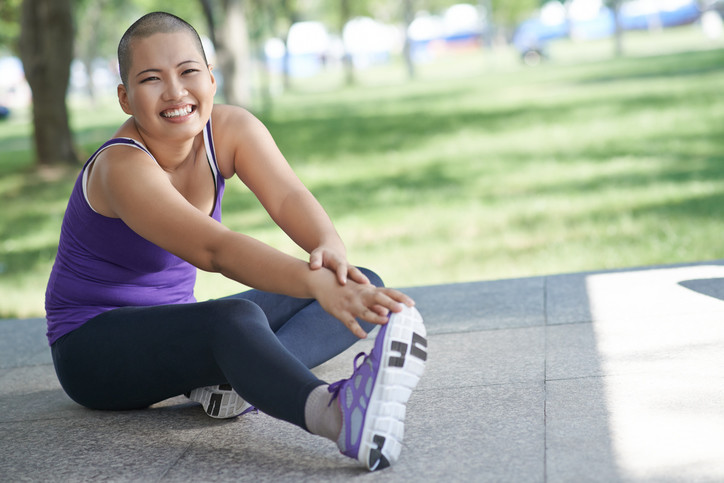
The old medical advice for cancer patients was to rest and reduce physical activity. This is still sound advice if movement causes pain, shortness of breath or a rapid increase in heart rate but new research has shown that not only is exercise during treatment safe it can also help to overcome cancer-related fatigue, and improve your overall quality of life.
Recent research is further showing that too much rest can lead to muscle weakness and a loss of body function, hindering you body’s ability to heal and complement your treatment. That’s why these days, oncologists are urging their patients to as active as possible for their physical and mental health.
How active should I be?
Being more active doesn’t mean you have to train for marathons or exercise intensely; it’s more about maintaining your fitness. If running 5k is your thing and you’re capable of doing it or if you just want to help fight the fatigue that often comes with cancer treatment then I, Dr Rob Paterson, can chat to you about your personal circumstances and recommend various activities or refer you on to an exercise physiologist.
Here at Hunter Valley Oncology, when I talk about physical activity I look at two threads: daily activities such as gardening, cleaning, cooking, and climbing stairs and structured exercise like jogging, swimming, cycling and sports. I can work with you to decide what type and level of activity will provide the greatest benefits for you.
What are the benefits of exercise?
Exercise offers cancer patients many physical and emotional benefits, including:
- The prevention of weight gain that happens with some cancer treatments.
- Higher energy levels and less cancer-related fatigue.
- Greater mobility and flexibility of the joints.
- Better heart and lung function.
- Increased endurance and muscle strength.
- Better sleep.
- Improved digestion and less constipation.
- Less nausea and vomiting for some people who are having chemotherapy.
- More positive moods due to an increase in “feel good” hormones.
- A reduced likelihood of depression or a reduction in the severity of depression
- Fewer feelings of anxiety
- Feeling more positive and in control.
- An increased ability to cope with stressful situations
A study by the American College of Sports Medicine, American Cancer Society Guidelines and the US Department of Health, recommended cancer survivors to follow the same guidelines for healthy adults of similar ages. For example, if you are aged 18 – 64, you should aim for 150 minutes per week of moderate exercise or 75 minutes per week of vigorous aerobic exercise. You should also aim to do muscle – strengthening or resistance exercise on 2 days per week under the guidance of a trained exercise specialist to help avoid injury.
Tips for Adding Exercise to Your Daily Routine
Adding exercise into your daily routine doesn’t have to be difficult. Try some of these simple tips to increase your activity:
- Take a dog for a walk.
- Sweep the path or rake leaves.
- Park your car in the most distant car space so you can walk to the building.
- Play outdoor games with kids such as tag, soccer or hide and seek.
- Set aside 10 minutes breaks from your schedule to take a short walk.
- Use a pedometer and set yourself a goal to walk a certain number of steps
- Use a treadmill or lift weights while you watch TV.
- Join a walking club .
- Get busy in your garden.
- Take a walk at lunch time.
Before You Exercise
Sometimes cancer patients need to take precautions before commencing an exercise program. Things to do before exercising:
- Talk to your care team about the type of exercise that is right for you.
- Check on your white cell counts so you know if you need to avoid swimming pools, gyms, and other public places of exercise.
Things to remember:
- Ensure to increase your activity levels slowly to help your body adjust safely.
- Try short periods of exercise in between periods of rest.
- Listen to your body and rest when you need to.
- Include resistance exercises in your exercise program to enable you to maintain bone mass and lean muscle strength.
- Try to exercise your large muscle groups such as the back, thighs and abdomen. This helps to maintain muscle strength and flexibility.
- Avoid any exercise that puts you at risk for a fall or injury.
Choosing Someone You Can Trust
Several cancer studies point to the benefits of exercise and certain types of cancer respond well to exercise and produce better outcomes.
If you’re interested in discussing your diagnosis and the level of activity suited to you, you can either chat to your General Practitioner or ask them for a referral to book and appointment to see me.
For appointment bookings, please call (02) 4941 8424 or (02) 4942 2600 or use our online contact form.
Kind Regards,
Dr Rob Paterson
Hunter Valley Oncology
